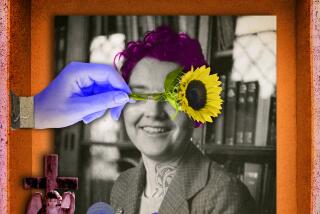Piri Thomas dies at 83; Latino writer
For Piri Thomas, being a dark-hued Latino in 1930s New York was far from the best of worlds. His siblings were fair-skinned, like his Puerto Rican mother, but he took after his black Cuban father, whose unsettled feelings about race scarred both of them. Thomas fell into gangs and drugs, shot a police officer during a robbery and ended up in prison for seven years.
He emerged from incarceration a writer, whose journey of self-discovery brought him enduring recognition as the author of a coming-of-age classic, “Down These Mean Streets.” The 1967 memoir, often compared to Claude Brown’s “Manchild in the Promised Land” and “The Autobiography of Malcolm X,” remains in print and is read widely in schools as a stylistic achievement and testament to the human spirit.
Thomas, 83, who died Monday of pneumonia at his home in the Bay Area city of El Cerrito, influenced younger generations of Latino writers, such as Dominican-American novelist Junot Díaz, whose “The Brief Wondrous Life of Oscar Wao” won the 2008 Pulitzer Prize for fiction.
“Thomas was one of my most important influences,” Díaz told The Times in an email. “He was the first Latino Caribbean writer I encountered who wove the U.S. Latino experience into a larger American conversation that engaged both white supremacy and the African American experience.
“He was a brilliant memoirist, and few could match his lyricism or his unadorned, demolishing honesty.”
Thomas was a pioneer of “Nuyorican” literature, the poetry and prose produced in the wake of a massive emigration of Puerto Ricans to New York in the 1950s.
“He was at the vanguard of mainstream Puerto Rican literary achievement in the U.S., along with Esmeralda Santiago, Miguel Algarin, Pedro Pietri and Jesús Colón,” said Daniel Gallant, executive director of the Nuyorican Poets Cafe, an arts organization in New York City that Thomas helped found in 1973. “His work helped to open the doors of the publishing and academic worlds to numerous Latino authors, and helped open the eyes of mainstream American readers to the sometimes harsh realities of Nuyorican life in the 1960s and beyond.”
Although best known for his memoir, Thomas was also a poet who gave exuberant readings of his work on college campuses and in prisons, where he held writing workshops and shared with inmates his hard-won life lessons.
When he landed in Sing Sing prison, “I found out that the cruelest prison is one’s own mind,” Thomas told the Alameda Times-Star in 2004. “I began to find my freedom through my writing.… I took the sounds of the street where I grew up, the sounds of my heart, trapping them there on the page.”
The oldest of seven children of Dolores Montánez and Juan Tomás de la Cruz, he was born Juan Pedro Tomas in East Harlem on Sept. 30, 1928. His name was later anglicized as John Peter Thomas. His mother called him Piri.
His youth was formed by the Depression and by racism, which he experienced not only in the outside world but at home with his father, who favored his light-skinned children. When the family moved to Long Island, Thomas’ torment worsened. His siblings could pass for white, but he was “a coffee bean in a sea of milk.”
Drowning in rage and confusion, he dropped out of school and moved back to Harlem, where he lived on the streets. When he was 15, his mother died of cancer. At 16, he joined the Merchant Marine. At 20, he was in a shootout with police during a robbery and wound up in Sing Sing.
In that grim and lonely place, he remembered the “wisdoms” of his mother, a spiritual woman who had encouraged him to love himself and do good in the world. “Mami said we all have powers in us,” he recalled in the Alameda Times-Star, “one is of darkness and the other of light and it’s up to us to choose.”
He chose to improve his mind. He earned a high school equivalency degree. He read voraciously — the Bible, the Koran, Confucius, Nietszche, Edgar Allan Poe, Ralph Ellison. And he pondered the traumas and tragedies of his life.
When he was released in 1956, he had completed a manuscript, but it went nowhere as he struggled to make his way in the straight world, working odd jobs and raising a family.
Married three times, he is survived by his wife, Suzanne Dod Thomas, two sons, four daughters, three stepchildren, seven grandchildren and two step-grandchildren.
Eventually, he found success helping to rehabilitate drug addicts and ex-cons, which drew the attention of an editor at Knopf. He rushed home to find his manuscript, only to discover it had been incinerated with the trash.
He spent five years reconstructing his story. In 1967, his efforts were rewarded with admiring reviews. “Piri Thomas screams back at a world that walked on him,” sociologist Lewis Yablonsky wrote in the Los Angeles Times, “and the sounds are clear, clean and worth hearing.”
Thomas also wrote two novels, “Savior, Savior, Hold My Hand” (1972) and “Seven Long Times” (1974), and a short story collection, “Stories from El Barrio” (1980). He was featured in two films, including the PBS documentary “Every Child Is Born a Poet.”
After moving to the Bay Area in 1983, Thomas continued to perform spoken-word concerts of his poems, sometimes set to music
At schools, juvenile detention centers and prisons, he spoke about tapping the creative spirit to overcome violence and alienation. Words, he often said, “can be butterflies or bullets,” and when he recited his words, his fingers fluttered in the air.
More to Read
Start your day right
Sign up for Essential California for the L.A. Times biggest news, features and recommendations in your inbox six days a week.
You may occasionally receive promotional content from the Los Angeles Times.





















































